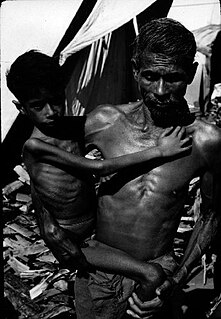
The body mass index (BMI) or Quetelet index is a value derived from the mass (weight) and height of an individual. The BMI is defined as the body mass divided by the square of the body height, and is universally expressed in units of kg/m2, resulting from mass in kilograms and height in metres.
Dieting is the practice of eating food in a regulated and supervised fashion to decrease, maintain, or increase body weight, or to prevent and treat diseases, such as diabetes. A restricted diet is often used by those who are overweight or obese, sometimes in combination with physical exercise, to reduce body weight. Some people follow a diet to gain weight. Diets can also be used to maintain a stable body weight and improve health.

The fat acceptance movement is a social movement seeking to change anti-fat bias in social attitudes by eliminating and raising awareness of discrimination towards overweight and obese persons. Areas of contention include the aesthetic, legal, and medical approaches to people whose bodies are fatter than the social norm. The movement has been criticized, with Cathy Young, writing for The Boston Globe, claiming that "the fat acceptance movement is hazardous to our health", and Barbara Kay, writing for the National Post, stating that "fat-acceptance is not the answer to obesity." However, studies have shown that stress is linked to obesity, and that encouraging overweight people to focus on losing their excess weight has been linked to an increase in over-eating, leading to more weight-gain. The modern fat acceptance movement began in the late 1960s.

Low-carbohydrate diets or carbohydrate-restricted diets (CRDs) are diets that restrict carbohydrate consumption. Foods high in carbohydrates are limited or replaced with foods containing a higher percentage of fats and moderate protein and other foods low in carbohydrates, although other vegetables and fruits are often allowed.

Heavyweights is a 1995 American comedy film directed by Steven Brill and written by Brill with Judd Apatow. The film centers around a fat camp for kids that is taken over by a fitness guru named Tony Perkis.

Weight gain is an increase in body weight. This can involve an increase in muscle mass, fat deposits, excess fluids such as water or other factors. Weight gain can be a symptom of a serious medical condition.
Fat fetishism is sexual attraction to overweight or obese people due to their weight and size.

Emaciation is defined as extreme weight loss and unnatural thinness due to a loss of subcutaneous fat and muscle throughout the body. It affects human beings and animals; one who is emaciated could be described as "wasting away" or being "gaunt." Emaciation is caused by severe malnourishment and starvation. Emaciation is a predominant symptom of malnourishment, a basic component of poverty and famine that also occurs with diseases that interfere with the digestive system and appetite, other systems, and eating disorders. These include nutrient deficiency disorders, diseases with prolonged fever and infection, malignant diseases, parasitic infections that can result from contamination, anorexia nervosa and other conditions. The malnourishment associated with emaciation has been referred to as "inanition", while infection by parasites has been described as "adulteration". Treatment of emaciation includes gradual renourishment with a slow increase of daily caloric intake to help rebuild tissues and regain weight. Rest, and emotional and psychological therapy and support may be included.

Diet food refers to any food or beverage whose recipe is altered to reduce fat, carbohydrates, abhor/adhore sugar in order to make it part of a weight loss program or diet. Such foods are usually intended to assist in weight loss or a change in body type, although bodybuilding supplements are designed to aid in gaining weight or muscle.
"The Non-Fat Yogurt" is the 71st episode of the NBC sitcom Seinfeld. It is the seventh episode of the fifth season, and first aired on November 4, 1993.
Fat feminism is a form of feminism that merges with the fat acceptance movement. This form of feminism specifically addresses how misogyny and sexism intersect with sizeism and anti-fat bias. Body-positive feminists promote acceptance for women of all sizes. Fat feminism originated during second-wave feminism. Now fat feminists main focus is eliminating perceived bias against fat people. Fat Feminist claim sizeists have negative opinions about people who are overweight such as being lazy, and eating unhealthy foods more often than they should.

Ultralight backpacking is a style of backpacking that emphasizes carrying the lightest and simplest gear safely possible for a given trip. Base weight is reduced as much as safely possible, though reduction of the weight of consumables is also applied.

Being overweight or fat is having more body fat than is optimally healthy. Being overweight is especially common where food supplies are plentiful and lifestyles are sedentary.
Wellspring Camps are a group of children's health and wellness camps located in California and Florida. The camp focuses on changing behavior and eating patterns in order to create long-term healthy lifestyles for participants. Due to "economic feasibility" Wellspring Camps is not currently operating. However, the camp previously operated in La Jolla, California and Melbourne, Florida.

Huge is an American drama series that aired on the ABC Family television network. The series is based on the young adult novel of the same name by Sasha Paley. The hour-long drama series revolves around eight teens sent to a summer weight loss camp called Camp Victory. Winnie Holzman and her daughter Savannah Dooley wrote the plot.
The social stigma of obesity or anti-fat bias has resulted in additional difficulties and disadvantages for overweight and obese people. Weight stigma is similar and has been broadly defined as bias or discriminatory behaviors targeted at individuals, because of their weight. Such social stigmas can span one's entire life, as long as excess weight is present, starting from a young age and lasting into adulthood. Several studies from across the world indicate overweight and obese individuals experience higher levels of stigma relative to their thinner counterparts. In addition, they marry less often, experience fewer educational and career opportunities, and on average earn a lesser income than normal weight individuals. Although public support regarding disability services, civil rights and anti-workplace discrimination laws for obese individuals have gained support across the years, overweight and obese individuals still experience discrimination, which may have implications to physiological and psychological health. These issues are compounded with the significant negative physiological effects associated with obesity.

E-6837 is an orally active, 5-HT6 agonist developed in an attempt to create an anti-obesity medication. In cell lines expressing rat 5-HT6 receptors, it acted as a partial agonist (on presumed silent receptors), while it acted as a full agonist on human 5-HT6 receptors (which are constitutively active). Oral administration of E-6837 reduced food intake, but only transiently. In rats, twice daily administration of E-6837 over the course of 4 weeks resulted in a 15.7% reduction in body weight, compared to 11% reduction for sibutramine. This weight loss remained significant for E-6837 after a 43-day withdrawal period, whereas the weight difference was non-significant for sibutramine (i.e., sibutramine had a rebound effect while E-6837 did not), and this weight loss was found to be due to a loss of fat mass. The reduction in fat mass in E-6837 treated animals was associated with a 50% decrease in plasma leptin levels, and also reduced glucose and insulin levels in plasma after a glucose tolerance test. This indicates that weight loss from E-6837 is associated with improved insulin sensitivity, and thus, better glycemic control.

Octopamine (molecular formula C8H11NO2) is an organic chemical closely related to norepinephrine. In many types of invertebrates it functions as an important neurotransmitter and hormone, but in the human body it normally exists only at trace levels and has no known function. Because it shares some of the actions of norepinephrine, octopamine has been sold under trade names such as Epirenor, Norden, and Norfen for use as a sympathomimetic drug, available by prescription. Very little information exists concerning its clinical usefulness or safety.











